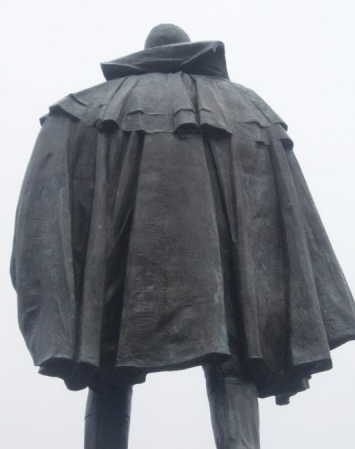 |

 |
 |

 |
October 30, 2008, The Halifax Herald Limited

Statue of Gov. Edward Cornwallis
Cornwallis Park
Barrington Street, Halifax, Nova Scotia
By DANIEL N. PAUL - Thu. Oct 30, 2008 - 4:47 AM
"The Indians who scalped your forefathers were open enemies, and had good reason for what they did. They were fighting for their country, which they loved, as we have loved it in these latter years. … What God in His bounty had given them, they defended like brave and true men. They fought the old pioneers of our civilization for a hundred and thirty years, and during all that time they were true to each other and to their country …"
The Englishmen who scalped our forefathers, mothers and children, and who authorized bounty hunters of many races to do so, did not have good reason for what they did; they were stealing another nation's land. Our ancestors were trying to protect their property and prevent their extinction. Logic tells me that what they did was above reproach – at least it would be in the eyes of reasonable people.
However, when it comes to Edward Cornwallis, reasonable people seem to be scarce. I find it almost incomprehensible that supposedly modern, civilized individuals can stoop to defending colonial English barbarism. They do so by recalling outrages allegedly committed by Mi'kmaq warriors – the Dartmouth incident for instance.
The following is what Cornwallis actually used as an excuse to issue his Oct. 2, 1749, scalp proclamation (quoted from An Unsettled Conquest, The British Campaign Against the Peoples of Acadia – Geoffrey Plank):
"In the summer of 1749, as a preliminary step to facilitate the introduction of settlers across the peninsula, Cornwallis … hoped that he might be able to convince the Mi'kmaq to make room for his settlers voluntarily.
"But given the long history of armed hostilities between the English-speakers and the Mi'kmaq in the 18th century, such a peaceful outcome was hardly likely. The first shots were fired by English speakers, probably New Englanders, who assumed that the Mi'kmaq would resist their efforts to occupy land.
"In the summer of 1749, a group of men whom the Mi'kmaq and the French identified as 'English' arrived at Canso with the apparent intention of reviving the local fishery. The newcomers discovered a community of Mi'kmaq women and children whose fathers and husbands had gone away to hunt and fish. According to the Mi'kmaq, the English killed 20 women and children. In September, when a second ship arrived at Canso from Boston, Mi'kmaq warriors seized the vessel and took 20 of the crew captive.
"Perhaps hoping to avert a full-scale war, they released the prisoners, but soon thereafter the fighting spread, first to the isthmus of Chignecto and finally to the vicinity of Halifax itself. Cornwallis was ready for this news; even before it arrived, he had begun making tentative plans for a campaign against the peninsula's Mi'kmaq bands. He vowed this would be the last Anglo-Mi'kmaq war and that there would be no peace agreement at the end of the fighting. Instead, he declared, he would 'root' the Mi'kmaq out forever. The governor and his advisors predicted that expelling the Mi'kmaq would be 'very practicable,' and 'no very difficult matter'."
I suggest the governor's defenders read Rebellion and Savagery, a well-researched history book about his participation in the Jacobite Rebellion. The more reasonable among them might become non-defenders.
I have a question for his defenders: If, instead of the Mi'kmaq, Cornwallis had placed a bounty on the heads of Acadians, women and children included, would you still be defending him?
Daniel N. Paul is the author of several books, including First Nations History: We Were Not the Savages.
Please visit thefollowing URL to read more about British barbarities
http://www.danielnpaul.com/BritishScalpProclamation-1749.html
Honourable Joseph Howe, 1867
DANIEL N. PAUL